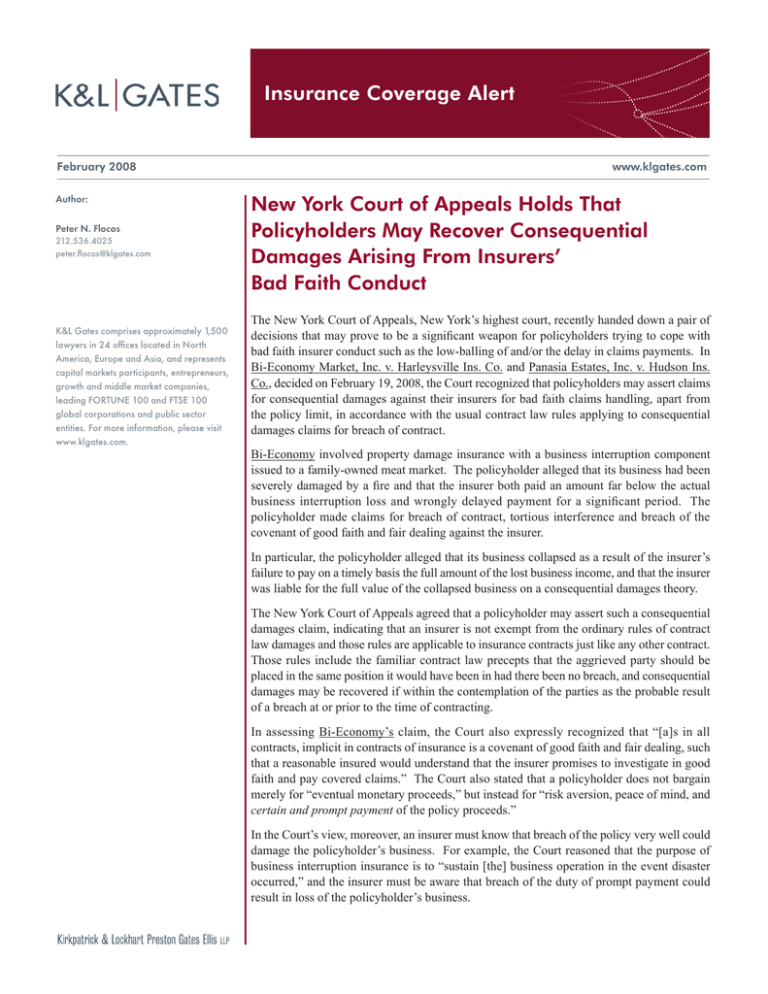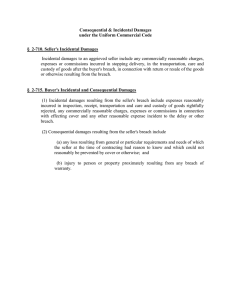
Insurance Coverage Alert
February 2008
Author:
Peter N. Flocos
212.536.4025
peter.flocos@klgates.com
K&L Gates comprises approximately 1,500
lawyers in 24 offices located in North
America, Europe and Asia, and represents
capital markets participants, entrepreneurs,
growth and middle market companies,
leading FORTUNE 100 and FTSE 100
global corporations and public sector
entities. For more information, please visit
www.klgates.com.
www.klgates.com
New York Court of Appeals Holds That
Policyholders May Recover Consequential
Damages Arising From Insurers’
Bad Faith Conduct
The New York Court of Appeals, New York’s highest court, recently handed down a pair of
decisions that may prove to be a significant weapon for policyholders trying to cope with
bad faith insurer conduct such as the low-balling of and/or the delay in claims payments. In
Bi-Economy Market, Inc. v. Harleysville Ins. Co. and Panasia Estates, Inc. v. Hudson Ins.
Co., decided on February 19, 2008, the Court recognized that policyholders may assert claims
for consequential damages against their insurers for bad faith claims handling, apart from
the policy limit, in accordance with the usual contract law rules applying to consequential
damages claims for breach of contract.
Bi-Economy involved property damage insurance with a business interruption component
issued to a family-owned meat market. The policyholder alleged that its business had been
severely damaged by a fire and that the insurer both paid an amount far below the actual
business interruption loss and wrongly delayed payment for a significant period. The
policyholder made claims for breach of contract, tortious interference and breach of the
covenant of good faith and fair dealing against the insurer.
In particular, the policyholder alleged that its business collapsed as a result of the insurer’s
failure to pay on a timely basis the full amount of the lost business income, and that the insurer
was liable for the full value of the collapsed business on a consequential damages theory.
The New York Court of Appeals agreed that a policyholder may assert such a consequential
damages claim, indicating that an insurer is not exempt from the ordinary rules of contract
law damages and those rules are applicable to insurance contracts just like any other contract.
Those rules include the familiar contract law precepts that the aggrieved party should be
placed in the same position it would have been in had there been no breach, and consequential
damages may be recovered if within the contemplation of the parties as the probable result
of a breach at or prior to the time of contracting.
In assessing Bi-Economy’s claim, the Court also expressly recognized that “[a]s in all
contracts, implicit in contracts of insurance is a covenant of good faith and fair dealing, such
that a reasonable insured would understand that the insurer promises to investigate in good
faith and pay covered claims.” The Court also stated that a policyholder does not bargain
merely for “eventual monetary proceeds,” but instead for “risk aversion, peace of mind, and
certain and prompt payment of the policy proceeds.”
In the Court’s view, moreover, an insurer must know that breach of the policy very well could
damage the policyholder’s business. For example, the Court reasoned that the purpose of
business interruption insurance is to “sustain [the] business operation in the event disaster
occurred,” and the insurer must be aware that breach of the duty of prompt payment could
result in loss of the policyholder’s business.
Insurance Coverage Alert
In allowing the consequential damages claim to
proceed, the Court also rejected the insurer’s contention
that policy exclusions for “consequential losses”
proved that consequential damages were not within the
contemplation of the parties at the time of contracting.
In the Court’s view, those exclusions speak only to
consequential losses caused by third parties or the
underlying events, not to consequential losses caused
by the insurer itself.
The companion case of Panasia Estates involved a
“builders risk” policy, not business interruption
coverage. The insurer denied coverage for a roof
collapse that occurred while construction work was
being performed on the policyholder’s building, and
the policyholder alleged that the coverage denial was
in bad faith and had caused consequential damages
(unspecified in the case). The Court briefly reiterated
that the reasoning of Bi-Economy applied equally,
such that “consequential damages resulting from a
breach of the covenant of good faith and fair dealing
may be asserted in an insurance context, so long as the
damages were within the contemplation of the parties
as the probable result of a breach at the time of or prior
to contracting.”
Two of the Court’s seven judges dissented in both
Bi-Economy and Panasia. The dissenters expressed
the view that the majority, in conflict with prior case
law, had opened the door to punitive damages awards
against insurers without any showing of “egregious”
conduct directed both to the insured and the “public
generally.” The majority, however, was of the view that
the dissent incorrectly “blurs the significant distinction
between consequential and punitive damages.”
It is not clear from the discussion in Bi-Economy and
Panasia whether policyholder consequential damages
claims are limited exclusively to cases of “bad faith”
insurer conduct or whether such claims may potentially
be asserted in connection with other types of policy
“breaches” by the insurer. Much of the discussion
in Bi-Economy is general, and if as the case suggests
the traditional common law rules of consequential
damages are applicable to insurance contracts as
with any other contract, then the breach in question
would not necessarily need to amount to “bad faith”
conduct.
In any event, at a minimum, Bi-Economy and Panasia
make clear that insurers now potentially face significant
consequential damages exposure for “bad faith” claims
handling and payment.
This publication is for informational purposes only
and does not contain or convey legal advice. The
information herein should not be used or relied upon in
regard to any particular facts or circumstances without
first consulting with a lawyer.
For further information, please contact:
Peter N. Flocos
K&L Gates
599 Lexington Avenue
New York, NY 10022
peter.flocos@klgates.com
212.536.4025
K&L Gates comprises multiple affiliated partnerships: a limited liability partnership with the full name Kirkpatrick & Lockhart Preston Gates Ellis LLP
qualified in Delaware and maintaining offices throughout the U.S., in Berlin, and in Beijing (Kirkpatrick & Lockhart Preston Gates Ellis LLP Beijing
Representative Office); a limited liability partnership (also named Kirkpatrick & Lockhart Preston Gates Ellis LLP) incorporated in England and
maintaining our London office; a Taiwan general partnership (Kirkpatrick & Lockhart Preston Gates Ellis - Taiwan Commercial Law Offices) which
practices from our Taipei office; and a Hong Kong general partnership (Kirkpatrick & Lockhart Preston Gates Ellis, Solicitors) which practices from
our Hong Kong office. K&L Gates maintains appropriate registrations in the jurisdictions in which its offices are located. A list of the partners in
each entity is available for inspection at any K&L Gates office.
This publication/newsletter is for informational purposes and does not contain or convey legal advice. The information herein should not be used
or relied upon in regard to any particular facts or circumstances without first consulting a lawyer.
Data Protection Act 1998—We may contact you from time to time with information on Kirkpatrick & Lockhart Preston Gates Ellis LLP seminars and
with our regular newsletters, which may be of interest to you. We will not provide your details to any third parties. Please e-mail london@klgates.
com if you would prefer not to receive this information.
©1996-2008 Kirkpatrick & Lockhart Preston Gates Ellis LLP. All Rights Reserved.
February 2008 | 2





